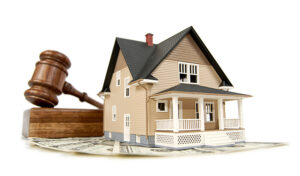Virginia HOA foreclosures are a possible consequence that homeowners may face should they fail to pay their dues. Believe it or not, members of an HOA risk losing their homes when they default on their payments, with the association taking possession of the home and auctioning it off to satisfy outstanding debts. Here’s what you need to know if you’re a homeowner living in an HOA community in Virginia.
Virginia HOA Foreclosures: Are They Legal?
Homeowners associations are responsible for the maintenance and operation of common interest communities. When joining an HOA, homeowners enter a binding agreement to follow the association’s rules and covenants. Membership is typically mandatory and occurs upon purchasing a home in the community. As members, homeowners must fulfill various obligations, including the obligation to pay regular dues to the association.
Homeowners who fail to pay their dues can face a handful of penalties. Depending on the association, these penalties can range from simple late fees to suspending member privileges. They can also escalate to liens, which an HOA can then choose to foreclose on.
In Virginia, state laws give HOAs and condo associations the authority to place a lien on a home and foreclose on the lien once perfected. You can find this under Section 55.1-1833 of the Virginia Property Owners’ Association Act and Section 55.1-1966 of the Virginia Condominium Act. Associations in Virginia use nonjudicial foreclosure, which is a type of foreclosure that does not require court supervision.
Homeowners associations and condos are entitled to a lien when owners do not pay their dues. For HOAs, it is necessary to file a memorandum of lien in the clerk’s office of the county or city circuit court within 12 months from the time the first payment became payable. An HOA must also provide the owner with written notice at least 10 days before filing the lien. The notice must be sent by mail.
For condos, it is necessary to record the lien in the county or city circuit court clerk’s office within 90 days from the time the first payment became payable.
Understanding Lien Priority
 When an association places a lien on a home, it entitles it to a payment upon the foreclosure sale of the home. However, the association may not be the first to receive payment from the sale proceeds. This is where lien priority comes in.
When an association places a lien on a home, it entitles it to a payment upon the foreclosure sale of the home. However, the association may not be the first to receive payment from the sale proceeds. This is where lien priority comes in.
Lien priority refers to the hierarchy of liens. Simply put, it determines who gets paid first using the proceeds from the foreclosure sale. In general, liens that are recorded first receive higher priority. As such, late liens may not receive any payment at all if the previous liens have a higher claim or if the proceeds don’t amount to much.
While “first in, first paid” is the general rule, lien priority can change depending on state laws and an association’s governing documents. In Virginia, state law dictates that after the perfecting of an HOA’s or condo’s lien, the lien takes priority over all other liens and encumbrances, except for the following:
- Real estate tax liens
- Liens and encumbrances recorded before the declaration was recorded
- Sums unpaid on and owing under any mortgage or deed of trust recorded before the lien was perfected (for HOAs)
- Sums unpaid on any first mortgage or first deed of trust recorded before the lien was perfected and before institutional lenders (for condos)
What Is the Foreclosure Process in Virginia?
Homeowners associations and condos must follow proper procedure, as state law dictates when initiating foreclosure proceedings. Failure to comply with the law can render the foreclosure void.
1. Notice of Filing
First, the association must send written notice of filing a memorandum of lien to the owner. The association must send this notice via certified mail to the owner’s last known address at least 10 days before the actual filing date.
2. Perfect the Lien
An association cannot begin foreclosure proceedings without perfecting the lien. To perfect a lien, an association must file a memorandum with the clerk’s office of the county or city circuit court where the association is located within 12 months from the time the payment first became payable. The principal officer of the association or other such officer specified in the declaration must verify the memorandum by oath.
This memorandum should consist of the following:
- The name of the development;
- A description of the lot;
- Name or names of the owners of the lot;
- The amount of unpaid dues currently outstanding, along with the date when each one became due;
- The date of issuance of the memorandum;
- Association’s name;
- The name and current address of the contact person for the arrangement of payment or release of the lien; and,
- A statement that the association is obtaining the lien in accordance with the provisions of the Virginia Property Owners’ Association Act.
3. Notice of Pre-foreclosure
Before foreclosing, an HOA or condo must first give the owner at least 60 days to settle their debt. The association should inform the owner of this through a notice of pre-foreclosure. The notice should also state that the association can sell the home in a foreclosure sale if the owner does not pay the debt. Additionally, the notice should state that the owner has the right to bring a lawsuit challenging the debt’s existence or any other defense against the foreclosure.
4. Notice of Sale
Virginia law requires HOAs and condos to advertise the sale in a newspaper for a set duration of time. This advertisement must include the sale date, time, and place.
Furthermore, the association must give the owner a copy of the newspaper advertisement via mail (certified or registered) or personal delivery. Alternatively, the association may mail or personally deliver a notice of sale containing the same information. If the association chooses to deliver the ad or notice by mail, it must do so at least 14 days before the sale.
Should the association postpone the sale, it must advertise the sale again in the same manner.
Right to Cure: What Homeowners Can Do
 Homeowners receive 60 days to settle their debt prior to foreclosure. An owner may stop the foreclosure sale by settling all of their unpaid dues, including any expenses the association incurred in the process, such as advertising costs and reasonable attorneys’ fees.
Homeowners receive 60 days to settle their debt prior to foreclosure. An owner may stop the foreclosure sale by settling all of their unpaid dues, including any expenses the association incurred in the process, such as advertising costs and reasonable attorneys’ fees.
The best way to avoid foreclosure in the first place is to pay your dues on time. Don’t let your debts stack up. If you are in financial trouble, approach your HOA board and ask for a reduction in dues, though this is not always possible. You may ask to enter a payment plan, too.
If you cannot get caught up on your dues and the HOA pushes for foreclosure, it is best to seek legal assistance. Hire a lawyer and get a defense plan in place.
Statute of Limitations for Virginia HOA Foreclosures
While associations can record a lien, the lien does not remain attached to the property indefinitely. An HOA or condo must initiate foreclosure proceedings or file a lawsuit to collect the debt within 36 months after the filing of the lien. Otherwise, the lien will expire.
How Long Does It Take to Foreclose on a House in Virginia?
When using nonjudicial foreclosure, the foreclosure process can conclude in as little as 60 days. Of course, there are several factors to consider, such as filing delays, notice deliveries, and advertising. A homeowner may also contest the foreclosure or stall the proceedings.
Word of Advice
Virginia HOA foreclosures are a real possibility, and most associations are not afraid to take this route when collecting a debt. Associations, though, should bear in mind that there is a proper way to foreclose on a home. Straying from the procedure outlined in state laws could render the foreclosure null and void. On the other hand, homeowners should do their best to keep up with all payments to avoid losing their homes.
Cedar Management Group offers management services to HOAs and condominiums, including legal assistance. Call us today at (877) 252-3327 or contact us online to request a proposal!
RELATED ARTICLES:
- Virginia HOA Laws
- Tennessee HOA Foreclosure: What Can Happen To A Homeowner’s Property?
- HOA Foreclosures In South Carolina: Beware Homeowners Who Fail to Pay Their HOA Dues






